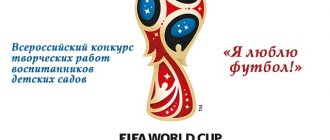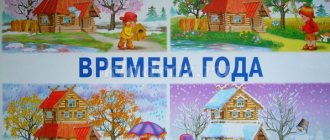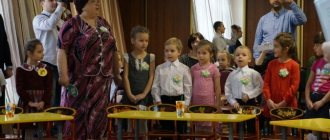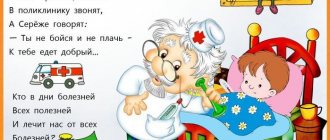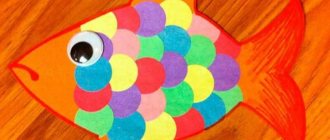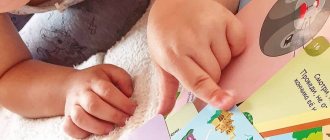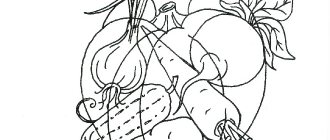Using educational games and exercises in theater classes
Experience as an additional education teacher.
Using educational games and exercises in theater classes Playing is a favorite activity for children. While playing, the child opens up, liberates, becomes free and cheerful. Everyone knows that theater is a collective art, and initially my first task, in the first year of study, was to unite a friendly creative team. When they first come to class, the children experience great difficulties in communicating: they are embarrassed by the teacher, each other, are afraid to go on stage when they see an audience, and cannot speak loudly and clearly. And to help the children in my classes, I use educational theater games. Play, as a special form of communication in the process of theatrical activity, is a set of specially selected tasks and exercises aimed at developing the basic psychological processes in children: (attention, memory, imagination, speech), which are fundamental components of acting. The methods, forms and content of theatrical games and trainings that I offer to children simultaneously realize three goals: - immerse children in the inherent atmosphere of the game; - develop memory, attention, imagination, fantasy, creative thinking; - impart to the educational process the qualities of interesting, exciting and fun work necessary for children. The main requirements that I adhere to in organizing games: - Content and variety of themes of games in the classroom. — Maximum activity of children at the stages of preparation and conduct of games. — Cooperation of children with each other and with adults at all stages of organizing games. — Constant, daily inclusion of games in all forms of the pedagogical process. -Consistency and gradual complication of the content of themes and plots selected for games that are appropriate to the age and skill of the children. After analyzing my gaming activities in the classroom, I compiled a list of games, exercises and trainings that I use at this stage of my teaching activity. These are educational games and exercises that include: •Game exercises to develop imagination and fantasy; •Stage attention and memory; •Speech exercises; •Sketches; •Game exercises for team building; • Dramatization games.
Game exercises to develop imagination and fantasy Imagination is the ability to mentally create new ideas and images of possible and impossible objects based on real knowledge. Fantasy is the creation of also new, but unrealistic, fabulous, yet impossible situations and objects, but also based on real knowledge. Goal: development of creative imagination, thinking and fantasy. In such exercises, children can work collectively, in groups or in pairs. "The Sculptor and the Clay." Participants are divided into pairs. One of them is a sculptor, the other is clay. The sculptor must give the clay the shape (pose) he wants. “Clay” is pliable, relaxed, “accepts” the shape that the sculptor gives it. The finished sculpture freezes. The sculptor gives it a name. Then “sculptor” and “clay” switch places. Participants are not allowed to talk.
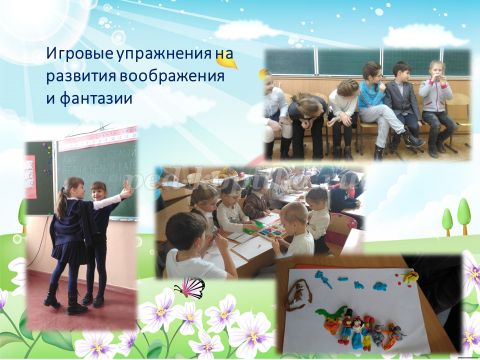
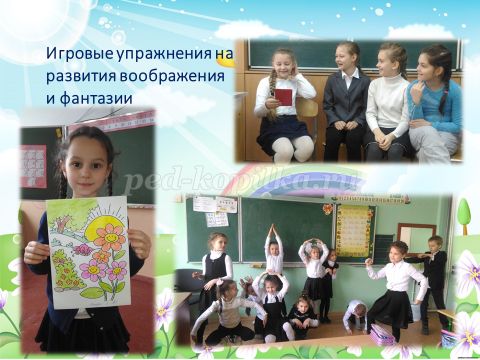
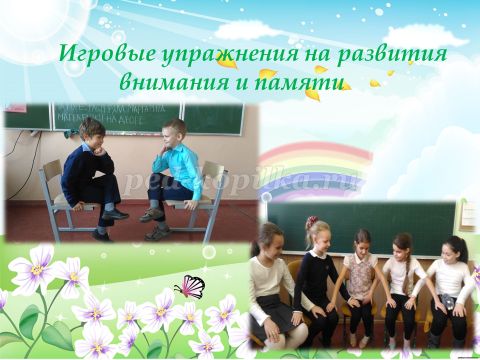
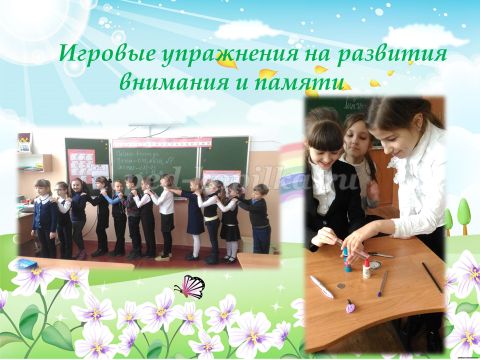
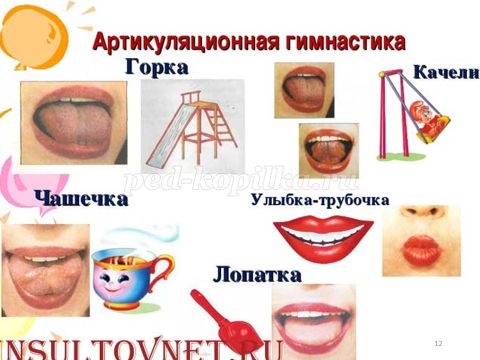
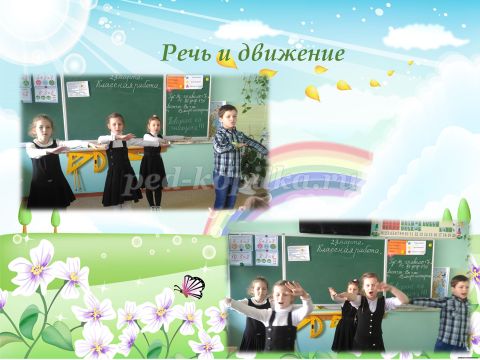
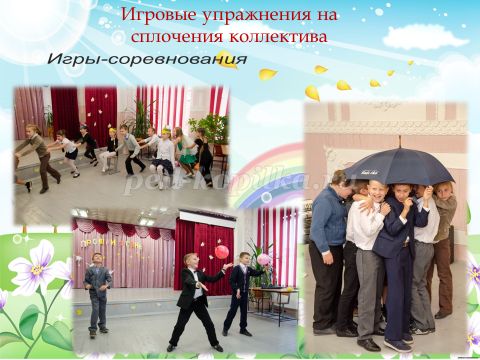
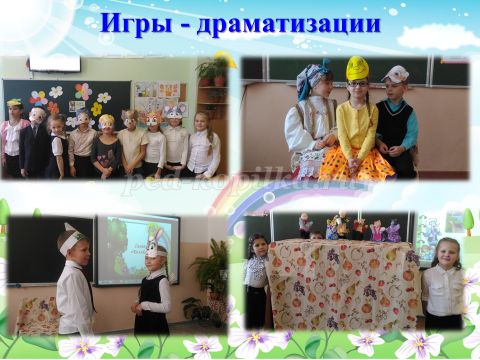
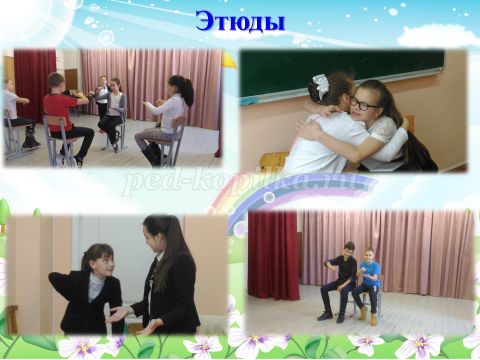
I always try to reinforce theoretical material with practical ones. Creative display is the most expressive and accessible form. I try to involve children in performances from the first day of classes. These are thematic theatrical holidays: autumn festival, New Year's party, environmental scenes, fairy tales. Children do not immediately master the ability to properly hold themselves in a role. To help them reveal their capabilities, long-term special systematic training in exercise games is needed. Creative activity helps children develop memory and a sense of responsibility to the team.
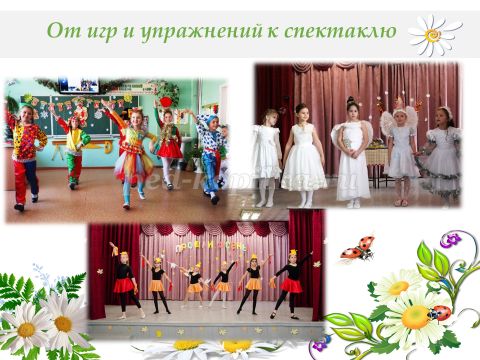
Over the years of work, I have come to the conclusion that if you conduct theatrical games and exercises with children more often, the lesson will not only be very interesting and varied, but in the future it will be much easier for them to work on the stage image in the play, since with the help of games and exercises and trainings, children acquire basic acting skills.
We recommend watching:
How to prepare a child's hands for writing Educational games for children 3 years old Educational game for children 5-8 years old Fun games for developing attention in children from 3 years old
Similar articles:
Educational games in pictures for children 4-5 years old
Educational games for children from 5 to 8 years old
Master class “Use of educational games and creative tasks in Russian language and literature lessons”
Competition for teachers for the best methodological development
Educational game for children 5-7 years old “The World Around Us”
LESSON STRUCTURE:
- Greetings and game exercises for attention and observation.
- Speech technique exercises.
- Tasks on plastic movements.
- Outdoor games.
Each lesson should contain some new element, exercise, task or game.
Hello kids, girls and boys!
Let's get to know you!
My name is Nonna Vladimirovna!
(I get to know the students in a playful way - I throw the ball, they throw the ball back to me, saying their name, or pass the ball to each other, also saying their name)
Guys, show me your five fingers:
Each finger greets the thumb and says “Hello” to it.
First slowly, then faster (3-5 times).
Now we will do an exercise, pronouncing the following text:
Finger on finger - knock, knock, knock!
Palm on palm - clap, clap, clap! Foot on the floor - top, top, top!
Now clench your hands into fists.
When naming a finger, we bend each finger simultaneously on both hands:
My little finger, where have you been?
— With the nameless one, I cooked cabbage soup.
And with average - I ate porridge.
And the big one met me
And he treated me to candy.
Today we will begin a long journey into the world of theater. Do you know who invented THEATER?
Theater was invented by the ancient Greeks and theater means SPECTRUM, people portrayed different heroes: bad and good, evil and kind, cheerful and sad.
Guys? What fairy-tale characters do you know? (there is a dialogue with the children).
Theater is magic! He can do everything.
We can go wherever we want.
Let's stand in a circle.
"Acting training in a children's theater group."
State Budgetary Institution of Additional Education House of Children's Creativity of the Kronstadt District of St. Petersburg
"City of Miracles"
Methodological development.
"Acting training in a children's theater group."
Author:
Bezborodova Olga Borisovna, preschool teacher,
GBU DO DDT Kronstadt district of St. Petersburg “Grad of Miracles”
Saint Petersburg
2018 Contents.
1. Introduction 3 pages
2. Goals and objectives 4 pages.
3. Theater games 5 pages.
4. Body, feeling, consciousness. 6 pages
5. Sustainability. Leader. Mastery of human psychophysics. 7 pages
6. Genty Theater 7 pages.
7. Theater mask 8 pages.
8. Visual-plastic performance according to the method of F. Jeanty as a way of self-expression for a child/teenager. 9 pages
9. Development of the inner world of a child/teenager and work with a mask. Correspondences and contradictions. 10 pages
10. Conclusion 11 pages.
11. Applications 13 pages.
11. References 14 pages.
Introduction.
Currently, children's theater activities are in demand in our country and throughout the world. There are many children's groups involved in this activity. In theaters, children capable of theatrical creativity find, acquire, learn new things for themselves, develop their creative abilities, in particular communication, necessary for human activity.
Since rehearsal is the main form of work of a theater group, this problem can be solved during rehearsals and with the help of theater training and creative exercises aimed at developing stage communication.
At this time, there is a great interest in children's theatrical creativity. This is due to several factors:
— children’s desire to express themselves, to realize themselves;
- the desire for collective creativity, where the child can reveal himself;
— expansion of the circle of contacts;
— the child’s interest is reinforced by the parents’ desire.
A child's (teenager's) activities in a theater group involve joint activities with a teacher - the organizer of the creative team, who acts as a director of the performance. The result of their work is the birth of the performance. And, in the future, the performance will be distributed, shown to the audience, and participated in children's theater festivals and competitions. However, a good, worthy result of creative work is also consistent work on educating and training the young actor on himself, i.e. acting training is a system of preparing, educating an actor, training his psychophysical apparatus. This work of a teacher-director as an acting training is currently becoming in demand as a separate, independent type of activity.
